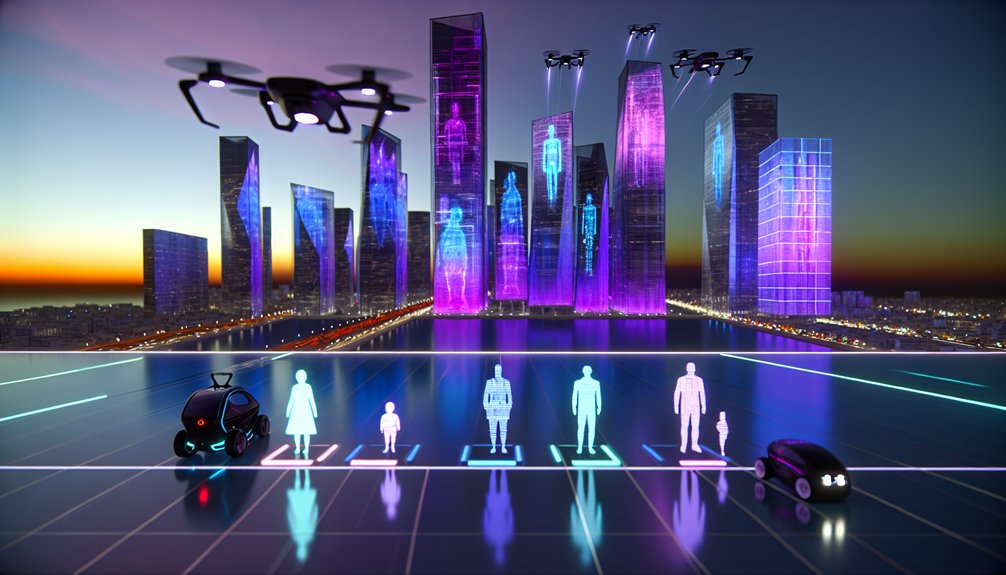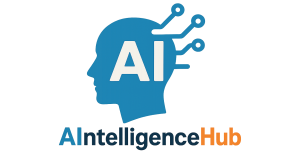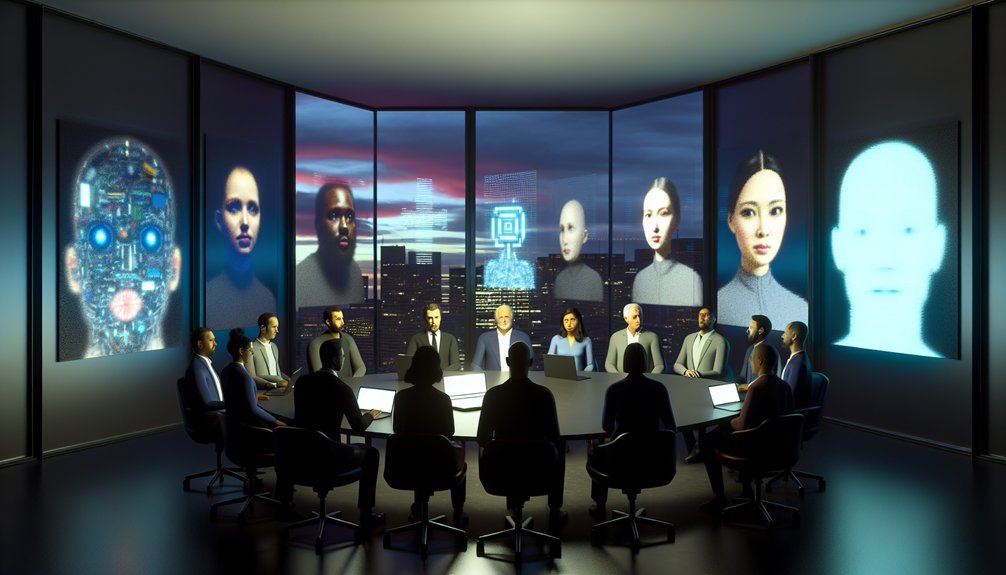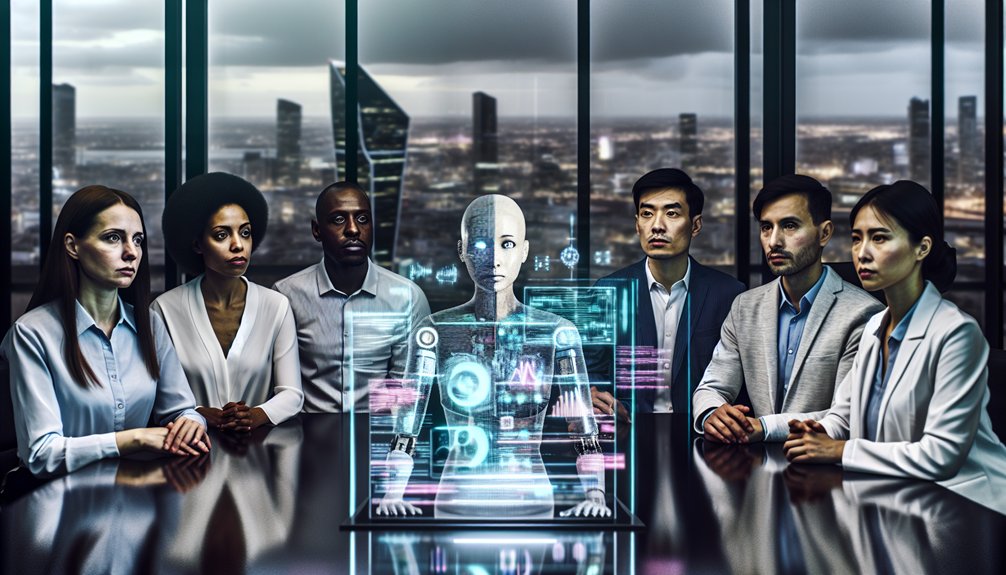
The future of AI holds transformative impacts on industries and workplaces by enhancing efficiency through technologies like NLP and computer vision. Ethical considerations, such as bias mitigation and transparency, are critical. As AI drives industry change, you’ll see automation, improved healthcare, and personalized education. Global collaboration will align ethical standards and regulations. While AI creates new opportunities, it also presents challenges in job markets, demanding focus on upskilling. Discover what’s beyond these initial insights.
Emerging AI Technologies and Their Impact

As cutting-edge AI technologies continue to evolve, they fundamentally reshape industries and alter the landscape of everyday life. In particular, natural language processing (NLP) and computer vision drive significant advancements. NLP enables machines to understand and generate human language, enhancing communication interfaces and automating text-based tasks. You’ll find improvements in customer service chatbots and language translation services. Meanwhile, computer vision allows systems to interpret visual information, revolutionizing fields like healthcare and manufacturing. This technology enables the automation of image analysis, such as diagnosing medical images or monitoring production lines for defects. Both NLP and computer vision empower businesses to increase efficiency and improve accuracy in data interpretation, fostering a more intelligent and interconnected world.
Ethical Considerations and Challenges in AI Development
While AI technologies advance rapidly, ethical considerations and challenges in AI development demand your attention. You must address bias mitigation to guarantee AI systems are fair and just. Implementing transparency requirements is essential to understanding AI decision-making processes. Without clear accountability frameworks, it becomes difficult to assign responsibility for AI actions and outcomes. Ethical guidelines are fundamental to guide developers and organizations in creating AI systems that respect human rights and societal values. Analyzing these elements will help you navigate the complex landscape of AI ethics. It’s important to balance innovation with responsibility, making certain that AI development aligns with legal and moral standards. By focusing on these areas, you contribute to a future where AI serves humanity ethically and effectively.
The Role of AI in Transforming Industries
When considering the profound impact AI has on industries, it’s clear that these technologies are transforming operational landscapes by enhancing efficiency and innovation. In healthcare, AI-driven diagnostics and personalized treatments are at the forefront of AI healthcare transformation, improving patient outcomes. Meanwhile, AI supply chain optimization reduces costs and streamlines processes, ensuring timely delivery. In marketing, AI marketing strategies offer precise targeting and customer insights, revolutionizing how brands interact with consumers. AI financial services automate processes, detect fraud, and provide personalized financial advice, enhancing security and customer experience. Ultimately, AI educational tools adapt learning experiences to individual needs, fostering better educational outcomes. Each industry leverages AI’s capabilities to drive growth, demonstrating its pivotal role in modern business ecosystems.
AI and the Future of Work

Though AI reshapes the future of work, it’s vital to understand the mechanics behind this evolution. AI enhances efficiency by automating repetitive tasks, enabling you to focus on more strategic objectives. This shift supports a remote workforce, allowing flexibility and global talent access. However, automation also leads to job displacement, as AI systems replace roles that require routine task execution. To adapt, you must embrace upskilling and reskilling, focusing on areas where human creativity and emotional intelligence are irreplaceable. Understanding AI’s potential in augmenting your capabilities rather than replacing them can ease this change. It’s important to develop strategies that harness AI’s strengths while mitigating its impact on job markets, ensuring a balanced and productive future for the workforce.
Global Collaboration and Regulation in AI Advancement
As you navigate the evolving landscape of work reshaped by AI, the importance of global collaboration and regulation becomes apparent. Effective AI advancement requires robust global governance to harmonize efforts across countries. Without it, disparities in AI development and ethical standards can widen. Collaborative frameworks are essential for establishing consistent rules and protocols, ensuring fair access, and mitigating risks associated with AI technologies. You must engage with these frameworks to understand how international cooperation can address challenges like data privacy, security, and ethical AI use. By participating in these initiatives, you’ll contribute to a balanced approach that encourages innovation while safeguarding societal interests. Emphasizing shared goals and transparent communication will be vital in fostering a responsible global AI ecosystem.
Frequently Asked Questions
How Will AI Affect Personal Privacy in the Future?
You’ve got to take into account how AI’s growth might affect personal privacy. Data security becomes vital as AI systems collect and analyze vast amounts of personal information. Privacy regulations will evolve, demanding strict user consent to safeguard information ownership. Surveillance concerns may rise, highlighting the ethical implications of AI’s role in monitoring. Balancing technological advancements with privacy rights is essential, ensuring users maintain control over their data in an increasingly AI-driven world.
What Are Potential AI Applications in Space Exploration?
Imagine AI as a cosmic compass guiding robotic exploration through the vast, uncharted ocean of space. You’ll see it excel in autonomous navigation, allowing spacecraft to make real-time decisions, dodging obstacles like meteoroids. AI’s analytical prowess enables precise data collection and analysis, enhancing mission efficiency. It assists in maintaining spacecraft health, predicting potential failures, and optimizing resources. This technological synergy propels humanity further into the universe, illuminating our path through the stars.
How Can AI Contribute to Mental Health Solutions?
You’re exploring how AI can aid mental health solutions. Therapy chatbots provide immediate support, offering users a confidential space to express emotions. They analyze responses and suggest coping strategies. Predictive analytics, on the other hand, can identify patterns in patient data, helping clinicians predict potential mental health crises. AI’s precision in interpreting vast data sets enables early intervention, optimizing treatment plans and improving outcomes for mental health patients.
Will AI Ever Develop Emotional Intelligence?
You’re curious if AI will develop emotional intelligence. Currently, AI utilizes emotional recognition to identify human emotions through facial expressions and voice tone. Empathy algorithms are being designed to simulate understanding and response. However, AI lacks true emotional experience. While it’s capable of mimicking empathetic behaviors, its understanding remains limited to programmed data sets. So, while AI’s emotional intelligence can improve, it’s unlikely to fully match human emotional depth and comprehension.
What Role Will AI Play in Education and Learning?
Imagine AI as a master sculptor, chiseling away at the rigid structures of traditional education. You’ll see how personalized learning transforms classrooms, tailoring content to each student’s pace and style. AI’s automated assessments streamline grading, providing immediate feedback and freeing educators to focus on mentorship. By integrating intelligent systems, you’ll witness a revolution in how knowledge is imparted, ensuring that learning is as dynamic and adaptable as the students themselves.
Conclusion
You’ll find it fascinating how AI’s evolution coincides with pivotal shifts across industries. As AI technologies advance, they’ll reshape how you work and interact with the world. You’ll need to navigate ethical challenges and embrace global collaboration to guarantee AI’s responsible development. Surprisingly, AI’s rise aligns with increasing calls for regulation, ensuring it benefits society. As you witness these transformations, you’ll realize AI’s future is not just inevitable; it’s already happening around you.



